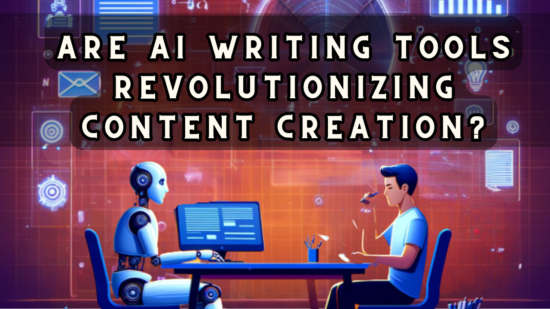Contents
Are AI Writing Tools Revolutionizing Content Creation?

In the digital age, the quest for efficiency and innovation in content creation has led us to the brink of a new era: the age of AI Writing Tools. Whether you’re crafting novels, essays, or blog posts, the landscape of writing is undergoing a seismic shift. But amidst this technological revolution, a pressing question lingers: Can AI replace writers?
AI Writing Tools for Novels
Embarking on writing a novel is thrilling yet challenging, filled with myriad obstacles for aspiring authors. Many often encounter hurdles, from self-doubt to time constraints, hindering their progress. And, they have to learn to navigate style, tone and other complex landscapes authors face. They often times, grapple with uncertainties and are forced to confront new challenges in their journey to completing their manuscript. However, with the rise of AI Writing Tools, content creation has been revolutionized.
For those looking to dive deeper into how AI can specifically enhance novel writing, exploring our Custom GPT for Authors: A Creative Companion offers insight into how AI is tailored to mimic the styles of literary giants, supporting authors in their creative process.
Here are five common hurdles faced by individuals when starting or completing a novel that the use of AI tools for writing can help you with:
Fear of Failure

Many aspiring writers dream of the perfect novel but hesitate to start, fearing failure. This fear appears as intimidation by personal standards or concern over others’ expectations. Fear of failure can paralyze, stopping individuals from taking their first step toward writing projects.
AI writing tools offer invaluable assistance to aspiring authors in overcoming the fear of failure. These tools offer vital support, aiding in idea generation, refining writing skills, and providing feedback and encouragement. AI-powered brainstorming features can ignite creativity, suggesting plot ideas, character concepts, or thematic elements to writers struggling with self-doubt.
Additionally, AI tools refine writing skills, offering grammar and style suggestions, boosting writers’ confidence. Moreover, AI tools provide feedback, encouragement, and guidance, fostering writers’ resilience and empowerment.
Time Constraints

For many aspiring writers, time constraints pose a significant hurdle. Balancing writing with work, family, and other commitments can be challenging. As a result, finding dedicated time for writing often proves elusive, leading to procrastination and frustration. AI writing tools offer practical solutions for writers facing time constraints. These tools automate tasks, offer real-time feedback, and streamline writing, maximizing writers’ limited time. Assisting in drafting, editing, and formatting, AI optimizes workflow, aiding progress. projects more efficiently.
Lack of Confidence
The lack of confidence can be a formidable barrier for aspiring writers. Despite harboring immense talent and potential, many writers may doubt their abilities and question the value of their ideas. As a result, they may hesitate to pursue their creative projects, fearing rejection or criticism. However, unbeknownst to them, a potential bestseller could be sitting on their desk, waiting to be unleashed. It’s the lack of confidence that hinders writers from taking the necessary risks and sharing their unique voices with the world.
In the face of self-doubt, AI writing tools emerge as empowering allies for writers, offering invaluable support and encouragement. These tools provide writers with instant feedback, constructive suggestions, and personalized guidance throughout the writing process. With AI as a reliable partner, writers gain confidence, refining skills and overcoming creative hurdles. AI empowers creativity.
Difficulty with Structure and Planning
For a comprehensive look at the diverse applications of AI in writing, our Complete List of Custom GPTs showcases how these tools cater to various needs, from novel writing to sports betting and finance.
Conclusion: A Collaborative Future
The integration of AI into the writing process heralds a future where technology and human creativity merge to unlock unprecedented possibilities. Far from replacing writers, AI tools stand to amplify our creative potential, offering new pathways to explore the art of storytelling. As we venture into this uncharted territory, it is the synergy between human insight and AI efficiency that will shape the future of writing.
Call to Action
Embrace AI writing tools as your allies in the creative process. Explore their potential, experiment with their capabilities, and let them inspire you to new heights of creativity and efficiency. The future of writing is not just about AI; it’s about the new horizons we can reach when we combine technology with the irreplaceable value of human touch.

